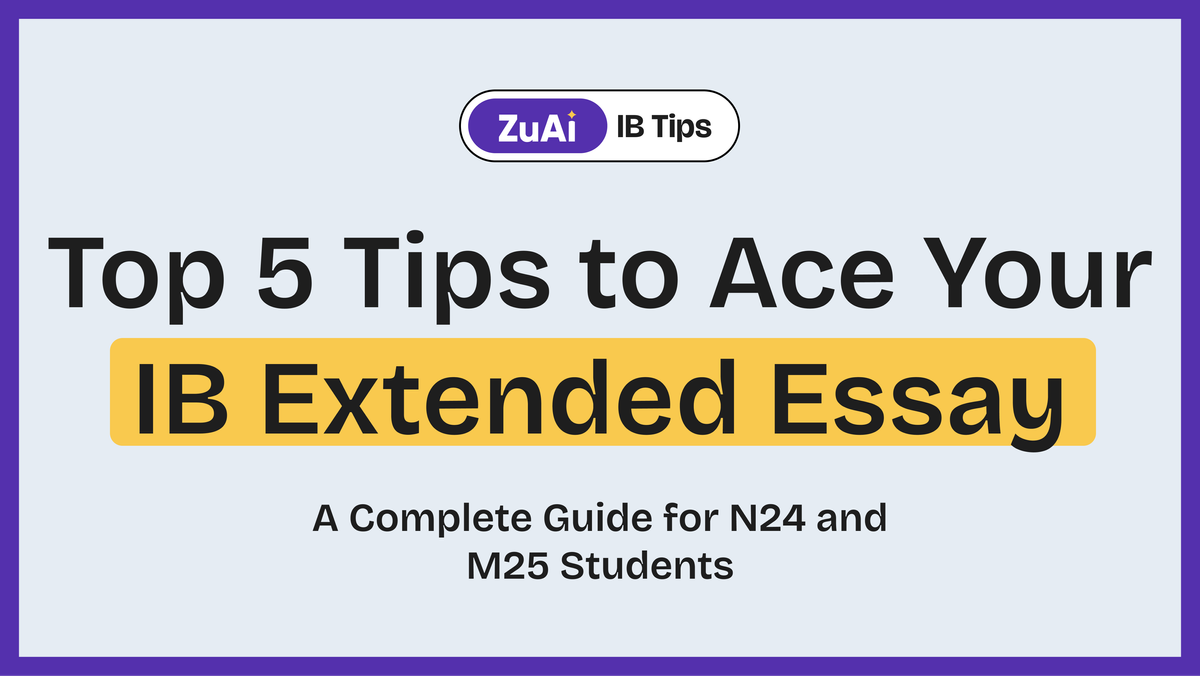Top 5 Tips to Ace Your IB Extended Essay (EE): A Complete Guide for N24 and M25 Students

Author: Hannah Peterson, IB EE Examiner and Teacher
Introduction
The IB Extended Essay (EE) is one of the most significant challenges you’ll face in the IB Diploma Programme. It requires you to independently research a topic of your choice, write a 4,000-word essay, and demonstrate critical thinking and academic writing skills. But don’t worry — with the right strategies and mindset, you can excel in your EE and score top marks!
In this guide, we’ll break down the top five tips to help you ace your IB Extended Essay, whether you're preparing for the N24 or M25 exam sessions. From choosing the right topic to perfecting your writing, we’ve got you covered.
Tip 1: Choose a Topic You’re Passionate About
The Extended Essay is a long project that requires substantial research and writing. The best way to stay motivated throughout the process is to choose a topic that genuinely interests you. Passion drives curiosity, and curiosity will lead you to ask better research questions and engage more deeply with the subject.
How to Choose the Right Topic:
- Pick a subject area you enjoy: Think about the IB subjects that excite you the most. Are you fascinated by history, biology, or literature? Your topic should reflect this interest.
- Make sure it’s specific: A good EE topic is focused, not broad. Avoid general topics like "The Impact of Climate Change." Instead, go for something like "The Effects of Climate Change on Coral Reef Ecosystems in the Caribbean."
- Ensure access to resources: Choose a topic for which you can easily find sources. Make sure there is enough scholarly material available for you to conduct thorough research.
Pro Tip: Talk to your EE supervisor early in the process for feedback on your topic. They can help you refine your ideas and ensure your topic is feasible.
Tip 2: Develop a Clear and Focused Research Question
Once you’ve settled on a topic, the next step is to craft a clear and focused research question. Your research question should guide your entire essay and provide a central focus for your analysis.
Characteristics of a Good Research Question:
- It’s open-ended: A good EE research question is not answerable by a simple yes or no. Instead, it should invite in-depth analysis and discussion.
- It’s specific and narrow: Your question should be focused enough that you can explore it thoroughly within the 4,000-word limit.
- It’s researchable: Make sure your question can be answered using available resources, including primary and secondary sources.
Example Research Question: “To what extent did the economic policies of the Weimar Republic contribute to the rise of extremist political movements in Germany?”
Pro Tip: As you research, refine your research question to make sure it fits the direction your essay is taking. A well-crafted question will keep your essay focused and coherent.
Tip 3: Organize Your Research
Effective research organization is key to producing a strong EE. You’ll need to gather, categorize, and cite a wide range of sources, so keeping your research materials organized from the beginning will save you time later on.
Steps to Organize Your Research:
- Create a research log: Keep track of all the sources you consult, including books, journal articles, and websites. Note the publication details for your bibliography.
- Categorize your notes: Group your research notes by themes or arguments that will form the structure of your essay. Use digital tools like Google Docs or Evernote to store and organize your notes.
- Highlight key quotes and data: As you research, highlight key information and quotes that support your arguments. This will make it easier to reference them in your essay.
Pro Tip: Use citation management tools like Zotero or EasyBib to organize your sources and format your citations correctly in MLA, APA, or Chicago style.
Tip 4: Structure Your Essay for Clarity and Flow
A well-structured essay is easier to read and understand, which can make a big difference in how it is graded. Your EE should follow a clear structure that guides the reader through your arguments and evidence.
Ideal Structure for Your IB Extended Essay:
- Introduction: Present your research question and provide background information on your topic. Outline the scope of your essay and explain the significance of your research.
- Body paragraphs: Organize the body of your essay into sections that address different aspects of your research question. Each paragraph should start with a clear topic sentence and be followed by analysis, evidence, and examples.
- Conclusion: Summarize your findings and restate your answer to the research question. Reflect on the broader implications of your research and suggest areas for further study.
Pro Tip: Ensure each section flows logically from one to the next. Use transitional phrases and signpost your arguments so that your essay is easy to follow.
Tip 5: Proofread and Revise for Perfection
Your first draft is not your final draft. After completing your essay, it’s crucial to set aside time for thorough proofreading and revision. This will help you catch any mistakes, improve clarity, and ensure your argument is as strong as possible.
Steps to Proofread and Revise:
- Take a break: After writing your first draft, step away from it for a day or two. This will help you come back with fresh eyes.
- Read it aloud: Reading your essay out loud can help you catch awkward phrasing or unclear ideas that you may miss when reading silently.
- Check for consistency: Make sure your arguments are consistent and that each point clearly supports your thesis. Double-check your use of evidence and citations.
- Seek feedback: Ask your EE supervisor or a peer to read your essay and provide constructive feedback. They may spot weaknesses or inconsistencies that you missed.
Pro Tip: Don’t just focus on grammar and spelling — pay attention to the overall structure, argument, and flow of your essay during the revision process.
Bonus Tip: AI app for IB Exams = ZuAI
It's the ultimate AI app designed to help your child excel in their IB exams. As a parent, you want the best for your child, and so do we.
ZuAI provides personalized study support, practice questions, and detailed explanations tailored specifically to the IB curriculum.
Think of it as a smart tutor who understands your child’s unique learning needs, helping them tackle challenging subjects with confidence.
With ZuAI, you can feel reassured knowing your child is getting the extra help they need to succeed and build a bright future.
We genuinely care about your child's success and are here to support them every step of the way.

Looking for free solutions to previous year's question papers? Check out ZuAI's YouTube channel.
FAQ Section
Q1: How long should my IB Extended Essay be?
A: The IB Extended Essay should be approximately 4,000 words. Staying within this limit ensures that your research is focused and concise.
Q2: Can I change my research question after starting my EE?
A: Yes, you can adjust your research question as your research progresses, but make sure to consult with your supervisor before making significant changes.
Q3: How many sources should I use in my EE?
A: While there is no specific number of required sources, a strong EE typically uses a mix of primary and secondary sources to provide a well-rounded analysis. Aim for at least 8-10 credible sources.
Q4: How important is my introduction in the EE?
A: Your introduction is crucial because it sets the stage for your essay. It should clearly present your research question, explain the context of your research, and outline the direction of your essay.
Q5: How much time should I spend on proofreading my EE?
A: Set aside at least one week for proofreading and revisions. A well-polished essay can make a significant difference in your final grade, so don’t rush through this step.
Conclusion
Writing a high-scoring IB Extended Essay requires careful planning, thorough research, and clear writing. By choosing a topic you’re passionate about, developing a focused research question, organizing your research effectively, and revising your work, you can produce an EE that will impress your examiner and earn top marks. Remember to stay organized, seek feedback, and take your time with each step.
Good luck with your IB Extended Essay for N24 and M25!
